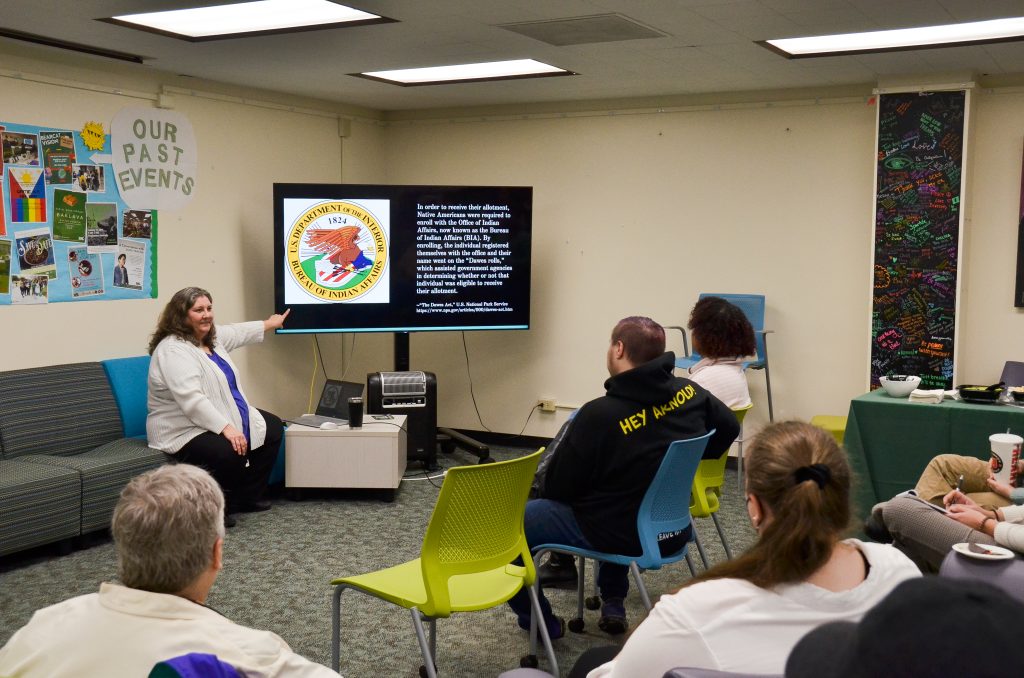On Thursday, the Multicultural Resource Center (MRC) hosted a “Culture Chat” in recognition of Native American Heritage Month.
The event was held in the MRC Lounge in Library South from 6 p.m to 7 p.m. It featured Jessica Garner, an adjunct faculty librarian at Harrisburg Area Community College and a member of the Choctaw Nation, who presented on the history of the “five civilized tribes” and chronicled legal battles between tribes and the United States government. The MRC hosted the event as part of their monthly “Culture Chat” series, during which community members discuss topics surrounding a different cultural theme related to each month.
Cecil Hopkins BA ‘18 MSW’ 26, serves as the coordinator at the MRC. In her role, Hopkins developed the “Culture Chats” as an in-person event at the beginning of the month and a podcast episode at the end of the month, which are both tied to different cultural recognition months. They said that Simone Clunie, the University Library’s assistant head of cataloging and metadata, reached out to propose Garner as a speaker for Native American Heritage Month. The event came to fruition after meetings with Clunie and Barrett Brenton, the Center for Civic Engagement’s faculty engagement associate.
“What we hope to do with this event is to educate, illuminate and create discussion about Native American heritage,” Hopkins wrote in an email. “The Native American population on campus is very small, so we wanted to make sure to highlight someone of Native American heritage to lead this [discussion]. Our expectation is that this experience will help attendees learn more about Native American heritage and culture, and its very important yet underplayed place in the United States. These events also continue to build and strengthen University partnerships with local and regional Native American communities.”
The event consisted of a presentation, where Garner spoke about Native American history, primarily focusing on the Choctaw Nation due to her personal connection with the tribe. She addressed the difficulties the Choctaw people tribe faced following the Trail of Tears and land allotments. Those who attended participated in a question-and-answer session, and Garner said that she wanted to provide a space for attendees to become better informed about Native American backgrounds.
“I like to make a safe space as far as like we’re here to learn,” Garner said. “But then I also like to talk to the audience and ask ‘what do you know, what do you want to know?’”
Garner highlighted the Dawes Act, passed by Congress in 1887, which was implemented to regulate land rights on tribal territories. She explained that the legislation gave small, lotted lands to the Choctaw tribe, making it harder for them to farm.
“The Choctaws were farmers, so we planted,” Garner said. “We were not traveling. We stayed in one location when we were farmers, so when this happened, it was breaking up the way we were traditionally farming as well.”
Garner’s presentation was broken down into different categories going into depth about land, colonization, laws, religion and other factors in the marginalization of Indigenous peoples. She expanded on her cultural background and described the difficulties her family has experienced to be recognized as members of the Choctaw tribe.
“The way we have to do it is slightly dictated to us by the Bureau of Indian Affairs, in that they have to have a certificate of Indian blood,” Garner said. “Now, because of the Dawes Act, that can be really fraught for people because you would essentially need to prove lineage, and that can be really hard.”
The Choctaw Nation is the third-largest Native American nation in the United States. Currently, they have over 212,000 tribal members, meaning that these individuals can trace their lineage and document their Choctaw blood.
After the presentation, Garner elaborated on what inspired her to become a speaker, saying it came from her educational background and that she wanted people to understand her Native identity.
Fiorella Wells Alania, an undeclared freshman, emphasized the importance of understanding Native American culture and history.
“Indigenous People’s Month is a significant time of year,” Alania wrote. “It is a month where we highlight the culture, art, music, food, literature, dances, tales and much more of Native groups. We must continue to celebrate these beautiful cultures to keep them alive and flourishing.”



